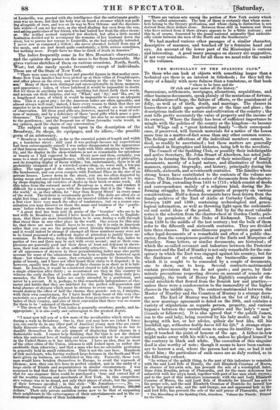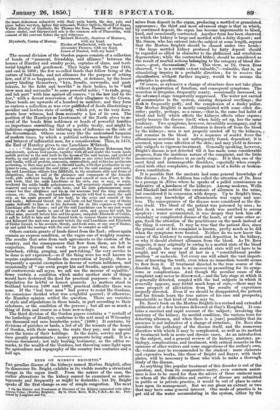THE MISCELLANY OF THE SPALDING CLUB. * To those who can
look at objects with something larger than a technical eye there is an interest in titledeeds ; for they tell the story of a family with more fulness than a tombstone, or that book
" where to be born and die Of rich and poor makes all the history."
Successions, settlements, mortgages alienations, acquisitions and other business documents, speak plainly of the mutations of fortune, the realizations of hope, the failure of efforts, or the punishment of folly, as well as of birth, death, and maniage. The clauses in leases throw a light upon agriculture at the tune and place ; the descriptions indicate the nature and cultivation of the country ; the rent tells pretty accurately the value of property and the income of its owners. Where the family has been of sufficient importance to mingle with the politics of the county or the kingdom—to become what Whigs call a "great historical family "—their correspond- ence, if preserved, will furnish materials for a notice of the house more true in a matter-of-fact sense than any other common source. The feelings and affections of the individual members cannot, in- deed, so readily be ascertained ; but these matters are generally overlooked in biographies and histories, being left to the novelists.
The Council of the Spalding Club, or possibly their indefatigable and active Secretary, Mr. John Stuart of Aberdeen, has acted judi- ciously in forming the fourth volume of their miscellany of family documents, mostly of a legal nature, and illustrative of Scottish manners, opinions, biography, and history, principally during the fifteenth, sixteenth, and seventeenth centuries. The families whose strong boxes have contributed to the contents of the volume are three. The Erskines furnish a series of documents from the charter- chests of Dun, extending from 1451 to 1713; which consist of deeds and correspondence mainly of a religious kind, during the Re- forming struggles in Scotland, or grants of property on various considerations. Half-a-dozen documents have been drawn from the family archives of the Earl of Airlie at Cortachy Castle, dating between 1420 and 1560; containing arelueological and genea- logical information, as well as throwing light upon the ecclesiasti:. cal and social ideas of the period. But by far the most valuable series is the selection from the charter-chest at Gordon Castle, pub- lished by permission of the Duke of Richmond.. These extend from 1338 to the middle of the last century ; but the bulk of them refer to the fifteenth and sixteenth centuries. They are divided into three classes. The miscellaneous papers contain grants and other legal documents of a remarkable and often of a public cha- racter, from the conspicuous position of the Earls and Marquises of Huntley. Some letters, or similar documents, are historical ; of which the so-called covenant and indenture between the Protector Somerset and the Earl of Huntley is not only remarkable for the con- spiracy in which the Earl was engaged against his country, but for the frankness of its recital, and the businesslike manner in which it is sought to be concealed by a couple of documents, one to show, one to keep. Several contracts-matrimonial contain provisions that we do not quote ; and prove, by their minute precautions respecting divorce on account of remote con- sanguinity, the truth of Henry the Eighth's complaints of the social mischiefs that flowed from the Romish law and practice,— unless these were a condescension to the immorality of the higher classes in the middle ages. The contract-matrimonial between the Master of Huntley and the Countess of Murray is a strange docu- ment The Earl of Murray was killed on the 1st of May 1455; the new marriage agreement is dated on the 20th, and contains a variety of stipulations as regards person, property, and various bygones between the contracting parties and the lady's "men" (vassals or followers). It is also agreed that "the quhilk mince, 3031 to the said lady, being received by his lady moder, sail be in keeping with her, or her advice, quhair she best like, till his lauchfull age, witlumten bodily harm till his life." A strange stipu- lation, whose necessity would seem to argue its inutility : but per- haps it touched the point of honour of the age. A father-in-law might make away with his wife's son unless he pledged himself to the contrary in black and white. he execution of this singular deed is also worthy of note ; though it seems to have been custom- ary to borrow a seal, where the person had not one, or had it not about him ; the particulars of such cases are as duly recited, as in the following extract
"In witnes of the quhilk thing, to the part of this indenture to remaindo with the said Lord Erie of Huntly, the said Elizabeth Countess of Murra, in absence of her awin sole, has prom& the sele of a worshipfull fader, Done John Bonalda, priour of Pluseardin, and for the mare sickenicss has subscrivit with her awyn hand, together with part of her men abufe wryten_; and to the part of this indenture remanande with the said Lady Elizabeth Countas of bdurra, the said Lord Erie of Huntelie for himself has sett to his proper sole, and the said Elizabeth Countass of Huntelie for herself has sets to her proper sele, and the said George, son and appearand heir to the said lord Erie, has procurit the sele of the said priour of Pluscardin, and for • The Miscellany of the Spalding Club, Aberdeen, Volume the Fourth. Printed for the Club,
the mare sickerness subscrivit with their awin hands, the day., yeir, and place before wrytten, bgfore thir witnesses Walter Ogilvie, Shemf of Walter Berclay of Garntuly, Sir Thomas the Ross, Chanons of Mum, an others sindry, and thimprocurit sole is the common sole of Pluseardm, with consent of the convent before the said witnesses. "Richard Rolando' ehantour of Murrave, Elyzabeth, Contaa of Murray. withmy hand. . Nicolas of Sutherland, with my hand, Alexander Flemyn, with my hand. James of Dunbar, with my hand."
The second division of the Gordon papers consists of a collection of bonds of " manrent, friendship, and alliance," between the houses of Huntley and sundry peers, captains of clans, and terri- torial knights and gentlemen. They begin with the year 1444, and end in 1609; the few so-called bonds that follow being of the nature of bail-bonds, and not alliances for the purpose of setting law, and if it so happened, government, at defiance, by the lesser gentry binding themselves, " kyn, frendis, serwandis, and part.- taker's, be the fatht and trewtht " in their bodies, to be "lean trew men and servandis " to some powerful noble ; "to ryde, gang, and talc part" with him against all comers " in the law and by the law," with a decent reservation of their allegiance to the Crown. These bonds are upwards of a hundred in number; and they form as curious a collection as was ever published of deeds illustrating a peculiar and lawless state of society, which yet, as the very docu- ments bear witness, had from necessity a law of its own. The position of the Huntleys as Lieutenants of the North gives to se- veral of the bonds from noblemen or heads of powerful families an importance resembling that of a public treaty, and might be judicious engagements for inlisting men of influence on the side of the Government. Others seem very like the understood bargains of modern times by which a political nobleman bought the votes and interest of influential men, for a consideration. Thus, in 1475, the Earl of Huntley gives to one Lanchlane MlIntosh, - - - - "the manage of the afris of umquhile the Barone lialmenan that last deeessit, quhom God assolze, togidder with all and sindri the warde lands quhilk pertene to the said lorde be the decess of the said barone, and ryeht of warde, ay and quhil ane or mar lauchfull Aria or aire ynter lauchfulli to the said lan&s, with all profetis, aismentis, eommoditeis, and richtwiss pertinents pertening, or that may pertene, to the said huidis, withthar pertinentis in ony rnis to cum endurant the said trim . and for the said mariage and warde, the said Lauellane oblissis him faithalli, in the strattaste stile aud forme of obligatione' that he sail at the pleisance and eommande of the forsaide lorde, giffe sufficient band* be the aviss and consell of men of law, to the said. lorde, that the saide Lauehlane or his airis, ane or may, or souls' , bruiktuid the saidis lanclis quhatsumeuer, sail perpotualy stande in speeiale manrent and seruice to the snide lorde, and his sins quhatsirmener, mane outane bet thar allegiance and his 4 our souerane lord the king afanerly outane, etc. Aka, the said Lauchlane promy-tis will God to mary the said airis on his soma procmit of his body, be the aviss and consell of the said lorde failezeand tharof, the said lorde sal haf theme or ony of thaim nine dehumit to him or to his factouris for sic like expenss as the said Lanchlane gins for thathe ; and gif the said Lauehlane can be ony just waft bryng al the said knells to ane of the said airis, and spouss her with his eldast sane, proeurit betuix him and his spouse, umquhile Elisabeth of Calder, It sail be lefull to him and the forsaid lorde to ressaue thame as tennandis ; and failzeand the said sone procurit betuix the said Lauchlane and Elisabeth of Caldor forsaicl, to his seeunde, threde, and ferde sane, or ony ane of theme, ay and quhil the inariage with the said aire be eomplet as said is."
Others contain grants of lands direct from the Earl ; others again contain no express condition, or the vague one of weighty reasons. The results that arise from such agreements as the custom of the country, and the consequences that flow from. them, are left to conjecture. Beyond the words "in peace and war, on foot or horseback, riding, ganging, and part-taking," the very service to be done is not expressed,—as if the thing were too well known to require explanation. Besides the reservation of loyalty, there is frequently i a special exemption in favour of certain noblemen and occasional y of "our awin propir kin and frendis, aganis quhome, gif contrawersie sail airs, we sail uss the mesour of equalitie." Sionie contain a condition which under another state of things would have destroyed the deed for practical purposes—there is a stipulation for lawful or honest quarrels. As matters stood in Scotland between 1400 and 1600, practical difficulty there was none. If the " leal true man" had power to resist the Gordons, his conscience. decided what was a rightful quarrel; if otherwise, the Huntley opinion settled the question. There are varieties of style and stipulations in -these bonds, in part according to their substance, or the condition of the persons but all are as much a thing of forint and course as a lease now-a-days.
The third division of the Gordon papers contains a " rentaill of the lordschipe of Huntlye, conforme to the sett maid at Witsonday ane thousand and same hundrethe yeirs." (1600.) It contains, by divisions of parishes or lands, a list of all the tenants of the house of Gordon, with their names, the rents they pay, and in special eases the terms of their holdings. In the rents, service and pro- duce greatly predominate ; money payments being small. It is a curious document; not only bearing testimony, as the editor re- marks, to the wealth of the Gordons, but throwing some light upon the agriculture and topography of the country two centuries and a half ago.



























 Previous page
Previous page